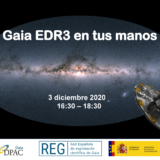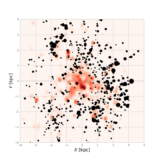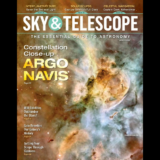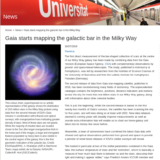Gaia EDR3 en tus manos
Coloquio-tertulia sobre los datos de Gaia-eDR3 Jueves 3 de diciembre, 16:30 a 18:30 Video del acto en YouTube Objetivos de la reunión A las 12:00 del próximo 3 de diciembre se hará pública la tercera entrega de datos de la misión Gaia, sin duda otro valioso hito esperado por la comunidad astronómica y, muy en particular, por nuestra comunidad REG. El equipo DPAC España queremos compartir, mediante este coloquio-tertulia, las lecciones aprendidas durante las fases de tratamiento de los datos y la obtención de los primeros resultados científicos publicados en los “demonstration papers”. Os...
read moreGaia Mission App Updated!!!
Delivering interesting and scientifically accurate information to the general public is a challenge. The Gaia Mission app is an interactive application for mobile devices designed to discover the details of the Gaia mission. All aspects of the mission are covered, from technical issues to the science behind it. The application is designed to keep users engaged during the whole mission and build interest on the mission achievements while stimulating enthusiasm for astronomy. iOS and Android support for both phones and tablets Combined, the two platforms capture 96% global market...
read more582 new open clusters in the Galactic disc of our Milky Way
Alfred Castro-Ginard et al. have found 582 new open clusters, using the data from the second release of the Gaia mission. Open clusters are groups of gravitationally bound stars, that were formed in the same event – so they have the same chemical composition and age – and share a common position and proper motion. Those open clusters are fundamental objects in galaxies, and key for the understanding of the structure and evolution of the Milky Way. While young open clusters allow researchers to trace the star forming regions and to understand the star forming mechanisms, intermediate and old...
read moreTeresa Antoja and Roger Mor interviewed at the Sky & Telescope magazine
Our astronomers Teresa Antoja and Roger Mor appear in this month’s edition of the Sky & Telescope magazine. They talk about the Gaia mission and how its data releases have been broadening the knowledge about our Milky Way. In the piece ““Data from the Gaia Spacecraft are unveiling the Milky Way’s tumultuous past”, Mor talks about his findings on the Milky Way’s stelar baby boom. Antoja says to the magazine “ Most of usare very lucky to be in this place and at this time. This topic in general, galactic dynamics, this will be the Golden age”. She has recently published...
read moreFrancesca Figueras talks about Gaia mission (RNE, 9/11/2019)
Francesca Figueras talks about Gaia mission at radio programme Sapiens. Full info at http://www.rtve.es/alacarta/audios/sapiens/sapiens-del-paleolitico-supermercado-09-11-19/5438492/ Hace 500 años creíamos que la Tierra era el centro del Universo, ahora sabemos que es un planeta más, de un sistema más de una Galaxia más. El conocimiento nos hace cada vez más pequeños pero a la vez la investigación científica nos hace más grandes. Hoy nos acompaña la astrofísica Francesca Figueras, Presidenta de la Asociación de Astronomía y miembro del equipo de científicos de la misión europea GAIA. En...
read moreGaia starts mapping the galactic bar in the Milky Way (Notícies UB, 16/07/2019)
Gaia starts mapping the galactic bar in the Milky Way (Notícies UB) The first direct measurement of the bar-shaped collection of stars at the centre of our Milky Way galaxy has been made by combining data from the Gaia mission (European Space Agency, ESA) with complementary observations by ground- and space-based telescopes. The study, published in Astronomy & Astrophysics, was led by researchers from the Institute of Science Cosmos of the University of Barcelona and from the Leibniz Institute for Astrophysics Potsdam (Germany). The second release of data from Gaia star-mapping...
read more









